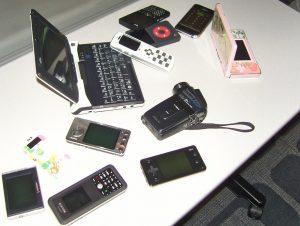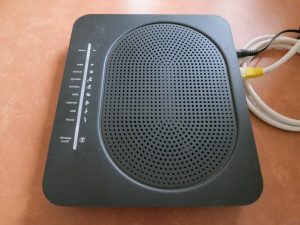| Average Australian home | $5000 a year |
|---|---|
| Smart renter | $2000 a year |
| Very smart renter | $1000 a year |
The above costs are part of the costs calculated in Appliances and gadgets.
To make the internet a useful resource as a smart renter, it’s important to be familiar with its bad side. Many writers and researchers have explored this already so this is just a short list of some of the drawbacks of being online:
- The internet has been figured out by advertisers and people who want to manipulate others for their gain, political or otherwise. Their algorithms are now very effective [1][2][3].
- The internet can be a massive time waster, especially that some social networking sites are designed to get your attention and keep it for as long as possible [4][5].
- The Christchurch massacre highlighted how easily extreme groups can proliferate online [6].
- Currently, 8% of the world’s electricity is used to power the internet, a figure that is only expected to grow [7].
At a household level
- Social media algorithms can prevent us from getting a healthy mix of viewpoints on a topic [8].
- There’s mostly shallow information online to cater to shorter attention spans [9].
- Lots of online time and the use of apps has led to the loss of basic skills like personal communication, navigation and critical thinking [10][11][12].
- More than one hour a day of online time and social media use has been linked to depression [13][14].
- Excessive screen time for children is having negative effects on child development [15].
- The costs for devices and connections really add up [16].

Ok, that’s the bad news. The good news is that with a few simple steps, you can make the internet your servant and not your master by combining some high tech and low tech solutions:
Use mobile data wisely and maintain your privacy
- Use an ad blocking browser. Not only are ads annoying, they also consume lots of data.
- Save your mobile data for when you really need it. It is more expensive and requires much more energy than broadband and Wi-Fi. Carry a book instead.
- Turn off your mobile data and your GPS/location setting when you are not using them.
- Limiting the use of mobile data can allow you to get by with a very cheap mobile plan (e.g. $15 a month or less)
Get informed
- Social media is not news; is it a selection of news links, web links and people’s opinions curated to suit your preferences.
- Compliment online information with quality news sources, podcasts, community radio sources and books (your local library is a great resource) to get a more in depth view of the world.
- Use a search engine that doesn’t collect your online data (e.g. DuckDuckGo) and doesn’t personalise your search results which can limit the information you find.
- Learn to have a healthy but not paranoid scepticism of news sources and to ask yourself if there is any motivation or agenda from the author. If something feels odd, cross check it.
- Fact checked information is a good starting point, e.g. The Conversation, Wikipedia or official bodies like the Australian Medical Association. No one is correct 100% of the time but these sources are held to account in a way that fake news sources are not.
Limit online time

- Share devices at home if possible (e.g. one household laptop) so that you will use your time online more wisely.
- Minimise online time to an hour or less a day on average (including video streaming) and children under two should avoid screen time altogether [17].
- Avoid social media or email apps on phones and switch off notifications. Access social media when you need it rather than leaving it on all the time.
- Switch off your internet router when the internet is not in use. This is psychological; it reminds you that the internet is only on when you want to use it.
- Limiting internet use also allows you to go on a cheaper home internet plan (e.g. $50 a month or less).
Pay your dues
- If regularly access information that is of a high standard, be prepared to donate or subscribe if possible. Good journalism and research should be encouraged.
Learn some real skills
- Learn to maintain skills without the internet, e.g. navigation without online maps.
- Get outdoors.
- Do some real stuff with real people.
The internet has undoubtedly bought us benefits like greater access to information, new ways to network and maintain contact with people and has changed the way we use many services. It can be a resource for smart renters who know how to navigate its downsides.
Further Reading:
[1] https://psmag.com/economics/how-we-give-online-advertisers-the-tools-to-manipulate-us [2] https://sloanreview.mit.edu/article/is-digital-advertising-a-new-form-of-market-manipulation/[3] Regardless of your political leanings, the idea that social media could be manipulated on a very large scale to influence a democratic election is very troubling:
https://time.com/5565991/russia-influence-2016-election/
[4] https://now.northropgrumman.com/this-is-your-brain-on-instagram-effects-of-social-media-on-the-brain [5] https://www.investopedia.com/ask/answers/120114/how-does-facebook-fb-make-money.asp [6] https://www.theguardian.com/news/audio/2019/mar/19/the-christchurch-massacre-and-the-rise-of-far-right-extremism [7] https://www.climatechangenews.com/2017/12/11/tsunami-data-consume-one-fifth-global-electricity-2025/ [8] https://www.wired.com/2016/11/filter-bubble-destroying-democracy/ [9] http://thetechnologicalcitizen.com/?p=414 [10] https://www.nature.com/news/technology-use-or-lose-our-navigation-skills-1.19632 [11] https://www.huffpost.com/entry/losing-essential-skills-t_b_8577818 [12] https://newyorkbehavioralhealth.com/the-impact-of-social-media-use-on-social-skills [13] https://www.sciencedaily.com/releases/2010/02/100202193605.htm [14] https://psychcentral.com/news/2018/11/11/too-much-screen-time-linked-to-anxiety-depression-in-young-children-and-teens/139931.html [15] https://www.ncbi.nlm.nih.gov/pmc/articles/PMC5823000/[16] Currently, the average person in Australia spends $2300 on internet devices, connections and services:
https://www.linkedin.com/pulse/how-much-do-consumers-spend-digital-technology-may-shock-mcdonald
[17] See this article for further recommendations for children: